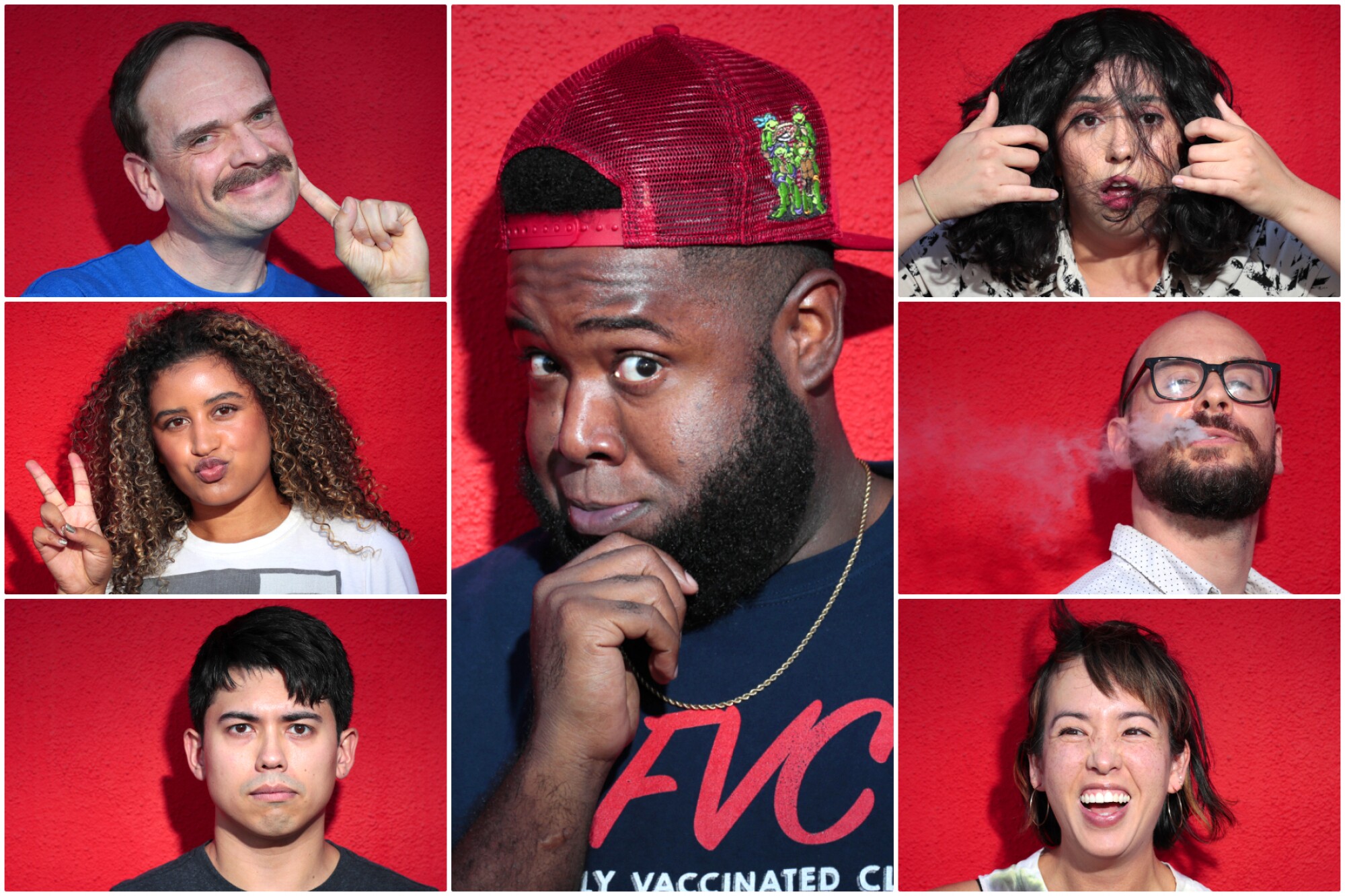
Comedy Co-op is a new endeavor formed by a group of local improvisers in the wake of numerous L.A. clubs foundering or shutting down during the pandemic. Among the comedians, clockwise from top left, David Theune, Leonard Smith Jr., Jessica “JZ” Zepeda, James Mastraieni, Nicole Pasquale, PJ McCormick and Paige Elson.
(Robert Gauthier / Los Angeles Times)
BY TODD MARTENS
GAME CRITIC
OCT. 3, 2021
“This is Rick,” says comedian Jessica Zepeda, holding up a plastic tree.
Rick is a cheap Christmas decoration that has been repurposed as a sort of talking animatronic puppet that Zepeda liked to use in some of their pre-pandemic shows. In seconds they’re giving a dissertation on how puppets should behave.
“I don’t think they should cuss,” says Zepeda. “But I love cussing. But I like puppets to be pure.”
Ten minutes later Zepeda has swapped Rick, a swear-free but self-deprecating tree, for a pair of books detailing the benefits of communal governance. Their ultimate goal? To build a better comedy scene.
More than a year and a half into the pandemic, we’ve come to expect the unexpected. Perhaps the socialist revolution can start in an improv community?
Enter the Comedy Co-op, a planned theater in the works by more than 30 local comedians.

Jessica “JZ” Zepeda.
(Robert Gauthier/Los Angeles Times)
“It’s radical,” says Zepeda, who once ran a diversity show at Upright Citizens Brigade and has become one of the new group’s largest proponents of sociocracy, which utilizes a series of committees to diffuse a hierarchal set-up.
“It is asking comedians to do something that we have never traditionally done, which is think beyond yourselves.”
And it’s speaking to a charged political moment of social reckoning, when institutions large and small are being re-evaluated on their diversity, equity and workplace harassment policies.
Born out of the pandemic, when a number of prominent theaters were singled out for a lack of diversity and spiraled into financial insecurity, the Comedy Co-op is an acknowledgment that improv and stand-up constitute a low-margin world serving those with the flexibility to spend thousands of dollars on classes. Participants also say the co-op fills a long-overdue need in shifting a robust community away from brand-name theaters like Upright Citizens Brigade, the Second City, iO and Groundlings into one that is owned and governed by the community.
If comedy theaters aren’t a path to getting rich or famous, perhaps one can show the Los Angeles performance world that there’s power in socialism? It’s a model based less on propping up local celebs and more about supporting a theater because of its perceived morals and ethics.
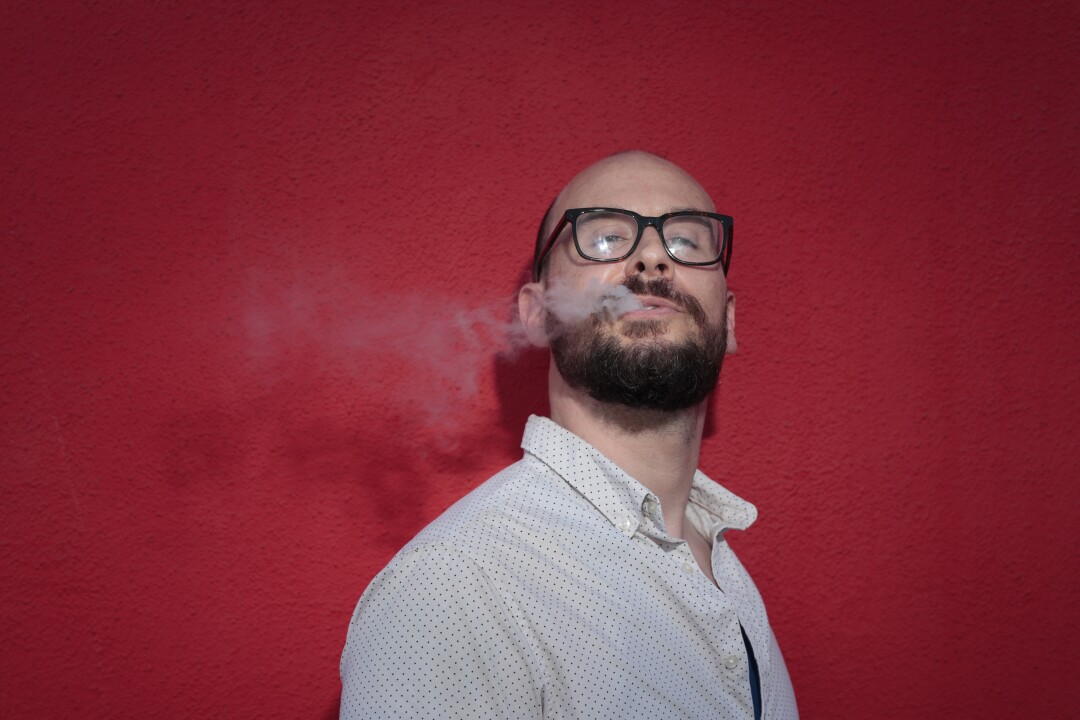
James Mastraieni was the initial organizer of the Comedy Co-op. There are now more than 40 members.
(Robert Gauthier/Los Angeles Times)
“During the pandemic, I had a lot of time to engage with my socialist sensibilities,” says actor-comedian James Mastraieni, who kickstarted the Comedy Co-op, where everyone who works or performs is a part-owner.
“I sent an email to about 150 comedians I’ve known over the years, and explained what this is. I said, ‘If this existed, could you see yourself supporting it?’ At the time I was in this headspace of wondering if I was the only one feeling really insecure about my place in a community I’ve been in for so long. It was cathartic to get responses back, and that was my motivation to dig deeper.”
Part of it.
In the wake of nationwide George Floyd protests against police brutality and systemic racism combined with pandemic fears, practically no industry, including comedy, was spared from having its shortcomings on matters of diversity aired in public. A number of local stages were downsized before the pandemic, including geek culture hub Meltdown and iO West.
In July of last year, more than a dozen local comics told The Times that Los Angeles stages were plagued with problems of institutionalized racism, driven by a white-led power structure that marginalized diverse voices. Grievances on social media and petitions were sent to theaters such as Groundlings, Upright Citizens Brigade and Chicago’s now-shuttered iO.
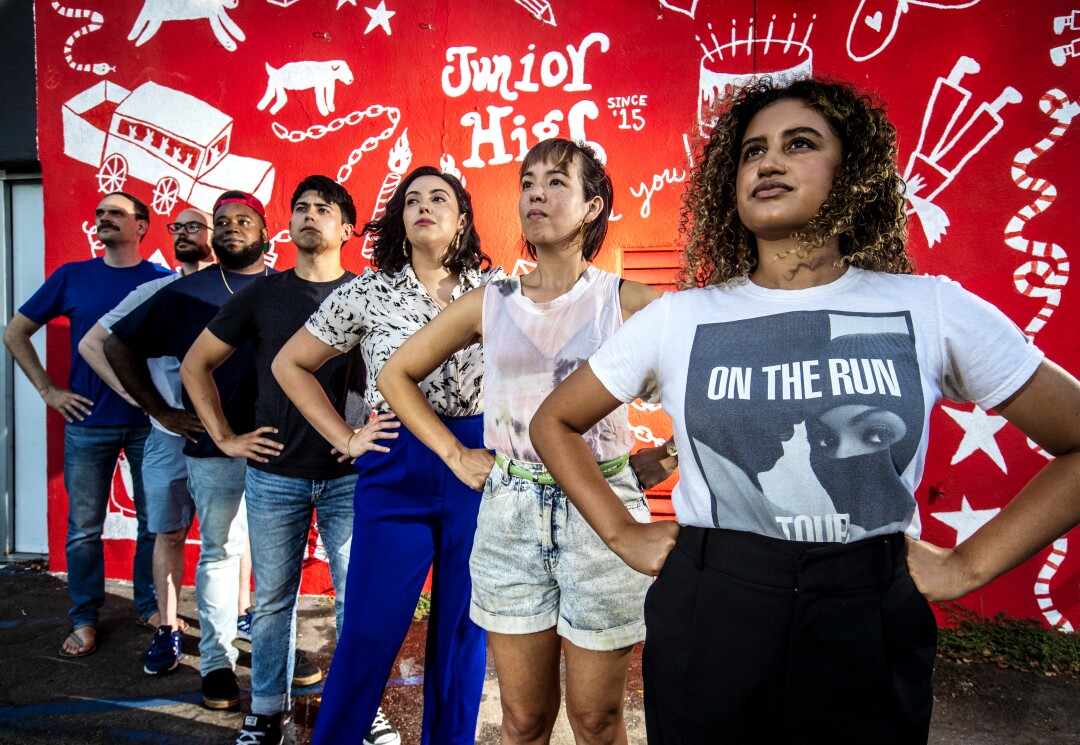
Comedy Co-op is a new endeavor formed by a group of local improvisers in the wake of numerous L.A. clubs floundering or shutting down during the pandemic. From right: Paige Elson, Nicole Pasquale, Jessica “JZ” Zepeda, PJ McCormick, Leonard Smith Jr., James Mastraieni and Dave Theune.
(Robert Gauthier / Los Angeles Times)
Things got bleak.
Upright Citizens Brigade, which began in Chicago before expanding to New York and eventually becoming the nexus of the L.A. scene, is down to just one stage after shutting its East Coast spaces. Those once credited for creating modern improv were questioned over the kind of scene they created, or if it even existed anymore.
While UCB has pledged to work closely with the community as it re-imagines itself as a leaner nonprofit, iO co-founder and comedy matriarch Charna Halpern said the same before confessing that the Chicago institution was money-less and she would be forced to find a buyer.
An earlier version of this story referred to Ruha Taslimi as an actress. The performer is non-binary and uses the pronouns they/them.
“Did I just invest over a decade in a place that’s not coming back?” says performer and co-op member Ruha Taslimi of the sensation of watching theaters contract and close during the pandemic.
But out of a sense of abandonment came a realization: One’s identity isn’t tied to a business. Or, as Taslimi says, “No. That investment was in myself.”
Veteran writer-performer Alex Fernie says those involved in the co-op feel a “recommitment” to the comedy scene.
“This is not just people showing up for the fun part. This is people working to ensure that there’s a long-term viability for this,” he says.
And if they can fight the power of capitalistic structures along the way, great.
“It feels very in line with the political uproar that’s happened,” actress and comedian Paige Elson says. “There’s socialists now. Anti-hierarchy, capitalism. That’s kind of cool. I was like, ‘Yeah, that sounds good to me.’”

Paige Elson
(Robert Gauthier / Los Angeles Times)
Will you have a committee for censorship?
These days, an interview with Mastraieni is just as likely to discuss comedy theory as it is political postulation.
As he’s been doing the interview rounds, he’s met those who don’t believe a membership-based, socialist-inspired method is possible. “I had expressed that I was a socialist,” says Mastraieni of a recent interview, “and they were like, ‘Will you have a committee for censorship and canceling comedians?’ What? No. There’s a misinformed idea that when people hear socialist or worker cooperative they think censorship.”
But the Comedy Co-op even has a plan for that.
“What’s important to me is to be solution-orientated,” Zepeda says. “If someone [screws] up on stage, we’re not going to kick them out. There’s going to be accountability. We tell people to act better, and give them no tools. We need to have sensitivity training.”
The Comedy Co-op wants the community to know that if it won’t always have the answers, it’s working its way through the questions. Membership tiers are being drawn by a 30-plus steering committee currently broken up into intimate groups of four to seven to focus on branches of running a cooperative business. Multiple people are in multiple committees, creating communal links to ensure — hopefully — no decision is made in a vacuum.
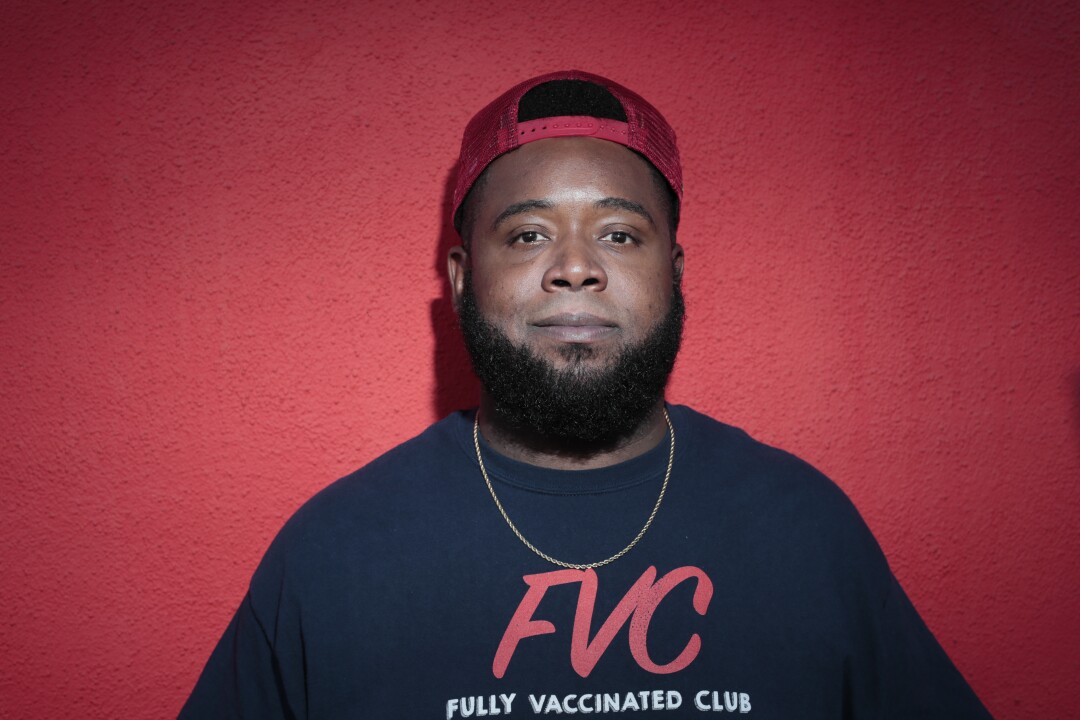
Leonard Smith Jr.
(Robert Gauthier/Los Angeles Times)
Two benefit shows — one stand-up and one improv at nonprofit Glendale performance space Junior High — have been set for Oct. 3. The improv gig, which will be live-streamed, has already sold out.
A crowdfunding campaign on Indiegogo will launch soon afterward, with the long-term goal of establishing a new L.A.-area theater. In the meantime, the do-it-yourself ethos of the Comedy Co-op has thrust a lot of improvisers into unsuspecting roles.
“I was at one of the early meetings, and James asked what 2% of $2,000 was and I threw the number out,” says actor and comedian Artoun Nazareth. “‘Oh, it’s $40.’ He’s like, ‘God, you’re good with numbers. You should be on the money committee.’
“So I ended up there. I’ve done a ton of research into tax law, and learned what the difference is between an LLC and a cooperative corporation,” Nazareth continues. “I didn’t know any of that was coming my way.”
But if the group is hopeful, it’s not delusional.
“We’re hoping to make enough to pay the performers and keep the lights on, and that’s it,” says Nazareth, adding all forms of alternate income will be looked at, from grants to finding a venue that could double as a filming location or allow alcohol sales.
And then, of course, there’s just the nature of any community with egos equally big and fragile.
“So many problems at so many places I’ve been involved with have stemmed from people not knowing what’s going on,” Fernie says. “It’s always going to be personal if a show doesn’t work or if a show gets ended because we put ourselves into them. But it’s worse when there’s mystery.
“On the money side, we want to be open. Here’s what’s coming in. You can see if we’re in trouble this month. I believe that transparency crosses off a lot of problems,” Fernie says.
That mind-set, says Zepeda, is among the group’s core mission statements.
“Anyone can complain,” says Zepeda. “Not everyone can problem-solve. That’s what sets us apart. I understand hesitancy. I hear it. But what other option is there? All the systems around us we have watched crumble and fall to the ground. We should be excited by ‘what if?’”
Not a rebellion
Everyone involved in the Comedy Co-op stressed that they want to see the likes of UCB return as better-run organizations.
“It’s like your family,” Elson says. “You love them. And sometimes you hate them. But it brought us together.”
If anything, the pandemic heightened generational discussions and concerns that were already bubbling under the surface.
“At some point Second City was the rebellion,” says actor and comedian David Theune. “And then maybe iO becomes the rebellion to Second City. At some point, the rebellion becomes the king and they’ve got to get taken down in some ways. That’s the way it goes.”
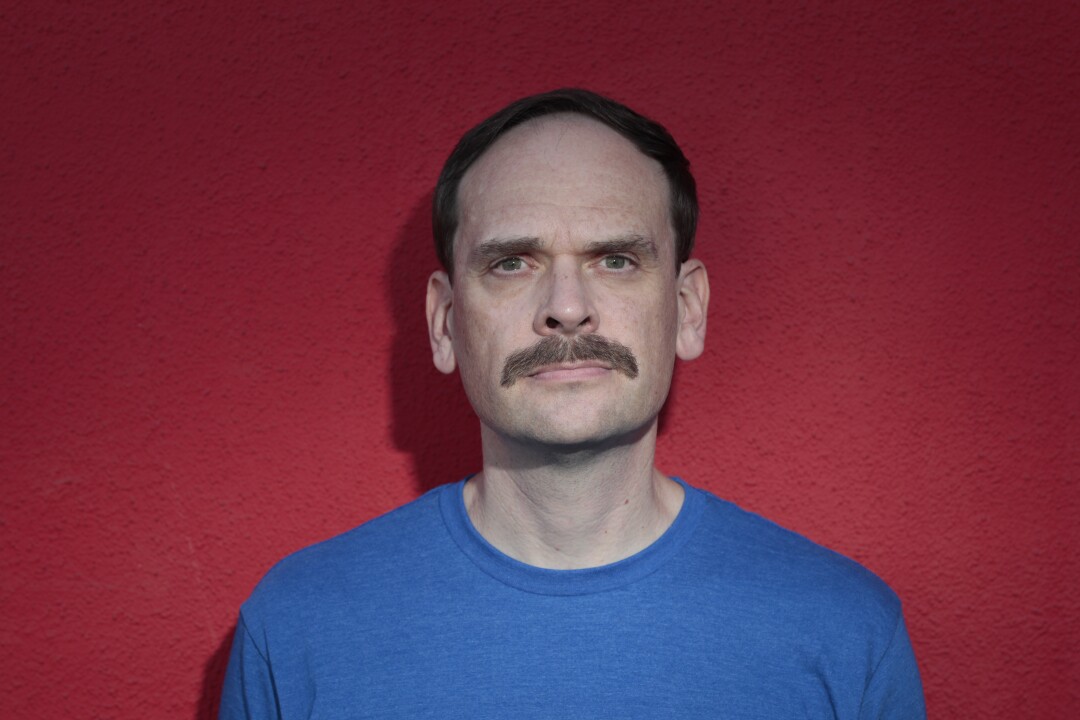
David Theune
(Robert Gauthier/Los Angeles Times)
Grievances with the established system aren’t hard to come by. Just prior to the pandemic, PJ McCormick landed a spot on one of UCB’s coveted Harold teams. McCormick, who once dreamed of being a pro wrestler, says the predominantly white L.A. comedy scene didn’t make his journey easy.
“You don’t want to be judged purely based on your stereotype of, you know, of your culture or your ethnicity,” says McCormick, who is half-Filipino and half-British. “So what tends to happen, as a diverse performer, you look up [at an audition panel], you see all the white faces, and you feel like, ‘Well, I’m not comfortable bringing my experience as a Filipino person to this stage, because they may not understand the references.’ And then you are not being authentic to yourself, and you’re probably going to ruin your audition.”
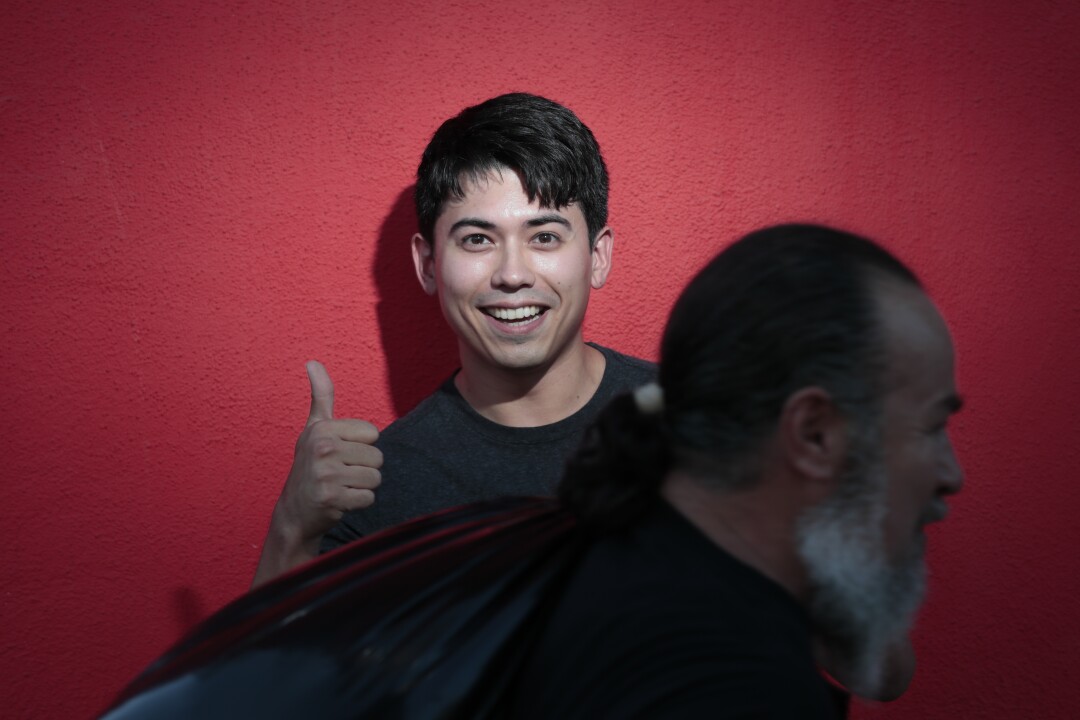
PJ McCormick
(Robert Gauthier / Los Angeles Times)
Such issues, Elson says, are a “microcosm of the entire entertainment industry,” but co-op members say they’re optimistic because diversity is ingrained into its mission statement. Zepeda, for instance, expresses pride when discussing the diversity showcase that they produced at UCB, but acknowledges there was awkwardness about it being segregated.
“It was always conflicting in our head, but then when we got to the green room with only Black, Indigenous and people of color performers, it was like, ‘Holy s—, we’ve never been in this space,’” Zepeda says. “So there is that wrestling, that tokenization, but also the necessity to fight to create a space where you can be yourself. We acknowledged it wasn’t perfect, and my mentality is that reforms are not possible in systems built on capitalism and white supremacy.”
Another concern: ensuring comedians get paid for their work. The Comedy Co-op hopes to allow performers to set their own ticket prices and take a percentage of the door. While no one has the misconceptions that such monies will cover rent — or even a burger — members want to erase the idea that appearing on a stage is payment enough.
The Comedy Co-op, however, will forgo a key money-making initiative of other theaters: no training academy. Part of that is simply an acknowledgment that there’s a number of quality improv classes offered throughout L.A. by theaters and individual performers.
But part of that is existential.
“What you find funny is what you find funny and you cannot be wrong,” Fernie says. “We want to be a place for you to pursue what you find funny. We don’t want to teach you what is funny. We want to go out of our way to reach out to schools and communities where people don’t feel welcome to check out shows.”

From left: Nicole Pasquale, Dave Theune, Paige Elson, Leonard Smith Jr., James Mastraieni, Jessica “JZ” Zepeda and PJ McCormick.
(Robert Gauthier / Los Angeles Times)
It’s still only comedy
Building a better comedy scene isn’t easy, regardless of the performers’ idealism.
“What I’ve known is that every single improv venue that I’ve ever been a part of, I’ve seen the same problems,” says Theune, citing money struggles and fights for stage time. “But when James had this idea, it was different. We’ve tried it these ways — and some have been unbelievably successful — but let’s try it a different way.”
And sure, at the end of the day it’s just comedy, but it’s worth stressing that the power to laugh with others is important, no matter how weird the show.
Nicole Pasquale, for instance, dreams of an early-morning performance of improvised synchronized dancing. “It’s just a fun hour,” Pasquale says. “That’s all I want to do. I want a room for silliness.”
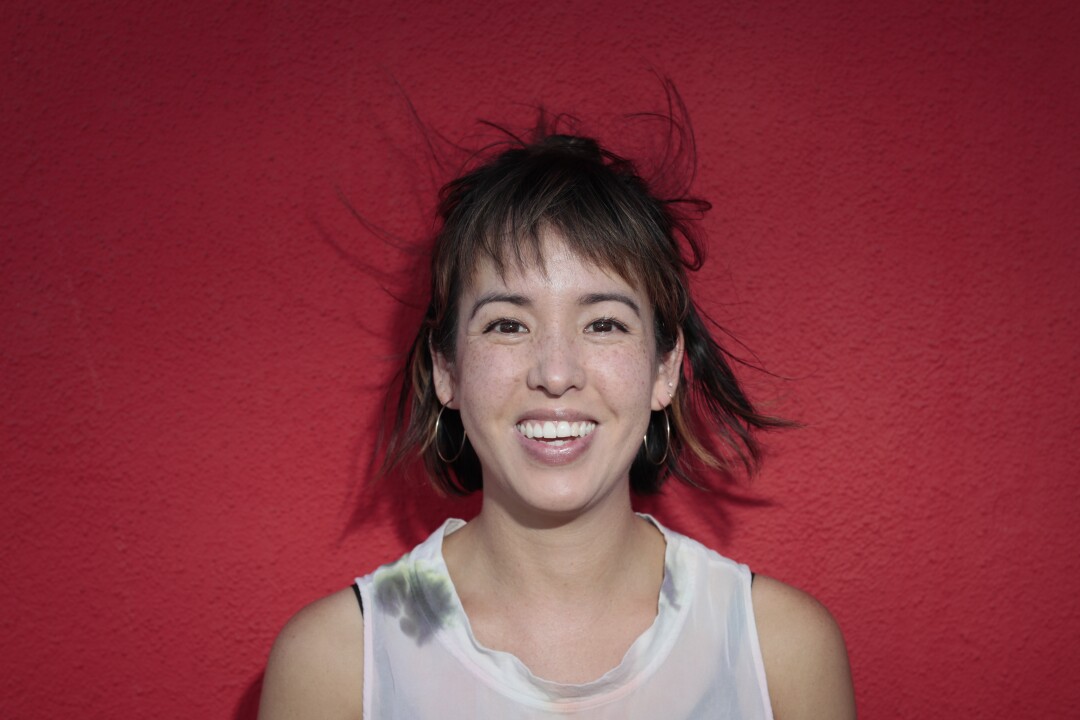
Nicole Pasquale
(Robert Gauthier/Los Angeles Times)
Leonard Smith Jr. can’t help but to launch into a bit of his stand-up during a phone call, even trying out some new jokes he wrote during the pandemic. And while he’s very much into the ideals of the Comedy Co-op — he admits he “made some remarks” in his ultimately rejected application for a diversity scholarship at UCB — his work is far from politically minded (“I talk about butts and sex,” he says).
For Smith, the co-op has been eye-opening in breaking down barriers. “You find your circle. You find your clique and you navigate that area, but here there’s a lot of faces I had seen but never talked to,” Smith says.
The co-op has been a lifeline for actor and co-op member Taslimi, who is immunocompromised and is not yet able to return to performing.
“It’s cheesy to say this,” says Taslimi. “I’ve done a lot of therapy, but some of my best therapy happens in this work. Being fearless, and trusting your voice, and supporting other people makes you a better person. It gives you a new relationship to your brain.”
These are among the ideals leading the co-op’s members to believe that a worker-run space is the way forward. Will it be perfect? Nope. But will it work?
“I don’t see this failing,” Zepeda says. “I’m full of self-doubt, but not with this. I see that people are working really hard, and I see everyone having to look at themselves in a different way. That’s what the past two years have been — sitting and looking at yourself. Unfortunately, it took us being robbed of our stages to value them and understand that there can be a better stage.”
Zepeda stops, takes a breath and sighs. “It’s going to work.”

Todd Martens joined the Los Angeles Times in 2007 and covers a mix of interactive entertainment (video games) and pop music. Previously, Martens reported on the music business for Billboard Magazine. He has contributed to numerous books, including “The Big Lebowski: An Illustrated, Annotated History of the Greatest Cult Film of All Time.” He continues to torture himself by rooting for the Chicago Cubs and, while he likes dogs, he is more of a cat person.
OCT. 3, 2021
“This is Rick,” says comedian Jessica Zepeda, holding up a plastic tree.
Rick is a cheap Christmas decoration that has been repurposed as a sort of talking animatronic puppet that Zepeda liked to use in some of their pre-pandemic shows. In seconds they’re giving a dissertation on how puppets should behave.
“I don’t think they should cuss,” says Zepeda. “But I love cussing. But I like puppets to be pure.”
Ten minutes later Zepeda has swapped Rick, a swear-free but self-deprecating tree, for a pair of books detailing the benefits of communal governance. Their ultimate goal? To build a better comedy scene.
More than a year and a half into the pandemic, we’ve come to expect the unexpected. Perhaps the socialist revolution can start in an improv community?
Enter the Comedy Co-op, a planned theater in the works by more than 30 local comedians.

Jessica “JZ” Zepeda.
(Robert Gauthier/Los Angeles Times)
“It’s radical,” says Zepeda, who once ran a diversity show at Upright Citizens Brigade and has become one of the new group’s largest proponents of sociocracy, which utilizes a series of committees to diffuse a hierarchal set-up.
“It is asking comedians to do something that we have never traditionally done, which is think beyond yourselves.”
And it’s speaking to a charged political moment of social reckoning, when institutions large and small are being re-evaluated on their diversity, equity and workplace harassment policies.
Born out of the pandemic, when a number of prominent theaters were singled out for a lack of diversity and spiraled into financial insecurity, the Comedy Co-op is an acknowledgment that improv and stand-up constitute a low-margin world serving those with the flexibility to spend thousands of dollars on classes. Participants also say the co-op fills a long-overdue need in shifting a robust community away from brand-name theaters like Upright Citizens Brigade, the Second City, iO and Groundlings into one that is owned and governed by the community.
If comedy theaters aren’t a path to getting rich or famous, perhaps one can show the Los Angeles performance world that there’s power in socialism? It’s a model based less on propping up local celebs and more about supporting a theater because of its perceived morals and ethics.

James Mastraieni was the initial organizer of the Comedy Co-op. There are now more than 40 members.
(Robert Gauthier/Los Angeles Times)
“During the pandemic, I had a lot of time to engage with my socialist sensibilities,” says actor-comedian James Mastraieni, who kickstarted the Comedy Co-op, where everyone who works or performs is a part-owner.
“I sent an email to about 150 comedians I’ve known over the years, and explained what this is. I said, ‘If this existed, could you see yourself supporting it?’ At the time I was in this headspace of wondering if I was the only one feeling really insecure about my place in a community I’ve been in for so long. It was cathartic to get responses back, and that was my motivation to dig deeper.”
Part of it.
In the wake of nationwide George Floyd protests against police brutality and systemic racism combined with pandemic fears, practically no industry, including comedy, was spared from having its shortcomings on matters of diversity aired in public. A number of local stages were downsized before the pandemic, including geek culture hub Meltdown and iO West.
In July of last year, more than a dozen local comics told The Times that Los Angeles stages were plagued with problems of institutionalized racism, driven by a white-led power structure that marginalized diverse voices. Grievances on social media and petitions were sent to theaters such as Groundlings, Upright Citizens Brigade and Chicago’s now-shuttered iO.

Comedy Co-op is a new endeavor formed by a group of local improvisers in the wake of numerous L.A. clubs floundering or shutting down during the pandemic. From right: Paige Elson, Nicole Pasquale, Jessica “JZ” Zepeda, PJ McCormick, Leonard Smith Jr., James Mastraieni and Dave Theune.
(Robert Gauthier / Los Angeles Times)
Things got bleak.
Upright Citizens Brigade, which began in Chicago before expanding to New York and eventually becoming the nexus of the L.A. scene, is down to just one stage after shutting its East Coast spaces. Those once credited for creating modern improv were questioned over the kind of scene they created, or if it even existed anymore.
While UCB has pledged to work closely with the community as it re-imagines itself as a leaner nonprofit, iO co-founder and comedy matriarch Charna Halpern said the same before confessing that the Chicago institution was money-less and she would be forced to find a buyer.
An earlier version of this story referred to Ruha Taslimi as an actress. The performer is non-binary and uses the pronouns they/them.
“Did I just invest over a decade in a place that’s not coming back?” says performer and co-op member Ruha Taslimi of the sensation of watching theaters contract and close during the pandemic.
But out of a sense of abandonment came a realization: One’s identity isn’t tied to a business. Or, as Taslimi says, “No. That investment was in myself.”
Veteran writer-performer Alex Fernie says those involved in the co-op feel a “recommitment” to the comedy scene.
“This is not just people showing up for the fun part. This is people working to ensure that there’s a long-term viability for this,” he says.
And if they can fight the power of capitalistic structures along the way, great.
“It feels very in line with the political uproar that’s happened,” actress and comedian Paige Elson says. “There’s socialists now. Anti-hierarchy, capitalism. That’s kind of cool. I was like, ‘Yeah, that sounds good to me.’”

Paige Elson
(Robert Gauthier / Los Angeles Times)
Will you have a committee for censorship?
These days, an interview with Mastraieni is just as likely to discuss comedy theory as it is political postulation.
As he’s been doing the interview rounds, he’s met those who don’t believe a membership-based, socialist-inspired method is possible. “I had expressed that I was a socialist,” says Mastraieni of a recent interview, “and they were like, ‘Will you have a committee for censorship and canceling comedians?’ What? No. There’s a misinformed idea that when people hear socialist or worker cooperative they think censorship.”
But the Comedy Co-op even has a plan for that.
“What’s important to me is to be solution-orientated,” Zepeda says. “If someone [screws] up on stage, we’re not going to kick them out. There’s going to be accountability. We tell people to act better, and give them no tools. We need to have sensitivity training.”
The Comedy Co-op wants the community to know that if it won’t always have the answers, it’s working its way through the questions. Membership tiers are being drawn by a 30-plus steering committee currently broken up into intimate groups of four to seven to focus on branches of running a cooperative business. Multiple people are in multiple committees, creating communal links to ensure — hopefully — no decision is made in a vacuum.

Leonard Smith Jr.
(Robert Gauthier/Los Angeles Times)
Two benefit shows — one stand-up and one improv at nonprofit Glendale performance space Junior High — have been set for Oct. 3. The improv gig, which will be live-streamed, has already sold out.
A crowdfunding campaign on Indiegogo will launch soon afterward, with the long-term goal of establishing a new L.A.-area theater. In the meantime, the do-it-yourself ethos of the Comedy Co-op has thrust a lot of improvisers into unsuspecting roles.
“I was at one of the early meetings, and James asked what 2% of $2,000 was and I threw the number out,” says actor and comedian Artoun Nazareth. “‘Oh, it’s $40.’ He’s like, ‘God, you’re good with numbers. You should be on the money committee.’
“So I ended up there. I’ve done a ton of research into tax law, and learned what the difference is between an LLC and a cooperative corporation,” Nazareth continues. “I didn’t know any of that was coming my way.”
But if the group is hopeful, it’s not delusional.
“We’re hoping to make enough to pay the performers and keep the lights on, and that’s it,” says Nazareth, adding all forms of alternate income will be looked at, from grants to finding a venue that could double as a filming location or allow alcohol sales.
And then, of course, there’s just the nature of any community with egos equally big and fragile.
“So many problems at so many places I’ve been involved with have stemmed from people not knowing what’s going on,” Fernie says. “It’s always going to be personal if a show doesn’t work or if a show gets ended because we put ourselves into them. But it’s worse when there’s mystery.
“On the money side, we want to be open. Here’s what’s coming in. You can see if we’re in trouble this month. I believe that transparency crosses off a lot of problems,” Fernie says.
That mind-set, says Zepeda, is among the group’s core mission statements.
“Anyone can complain,” says Zepeda. “Not everyone can problem-solve. That’s what sets us apart. I understand hesitancy. I hear it. But what other option is there? All the systems around us we have watched crumble and fall to the ground. We should be excited by ‘what if?’”
Not a rebellion
Everyone involved in the Comedy Co-op stressed that they want to see the likes of UCB return as better-run organizations.
“It’s like your family,” Elson says. “You love them. And sometimes you hate them. But it brought us together.”
If anything, the pandemic heightened generational discussions and concerns that were already bubbling under the surface.
“At some point Second City was the rebellion,” says actor and comedian David Theune. “And then maybe iO becomes the rebellion to Second City. At some point, the rebellion becomes the king and they’ve got to get taken down in some ways. That’s the way it goes.”

David Theune
(Robert Gauthier/Los Angeles Times)
Grievances with the established system aren’t hard to come by. Just prior to the pandemic, PJ McCormick landed a spot on one of UCB’s coveted Harold teams. McCormick, who once dreamed of being a pro wrestler, says the predominantly white L.A. comedy scene didn’t make his journey easy.
“You don’t want to be judged purely based on your stereotype of, you know, of your culture or your ethnicity,” says McCormick, who is half-Filipino and half-British. “So what tends to happen, as a diverse performer, you look up [at an audition panel], you see all the white faces, and you feel like, ‘Well, I’m not comfortable bringing my experience as a Filipino person to this stage, because they may not understand the references.’ And then you are not being authentic to yourself, and you’re probably going to ruin your audition.”

PJ McCormick
(Robert Gauthier / Los Angeles Times)
Such issues, Elson says, are a “microcosm of the entire entertainment industry,” but co-op members say they’re optimistic because diversity is ingrained into its mission statement. Zepeda, for instance, expresses pride when discussing the diversity showcase that they produced at UCB, but acknowledges there was awkwardness about it being segregated.
“It was always conflicting in our head, but then when we got to the green room with only Black, Indigenous and people of color performers, it was like, ‘Holy s—, we’ve never been in this space,’” Zepeda says. “So there is that wrestling, that tokenization, but also the necessity to fight to create a space where you can be yourself. We acknowledged it wasn’t perfect, and my mentality is that reforms are not possible in systems built on capitalism and white supremacy.”
Another concern: ensuring comedians get paid for their work. The Comedy Co-op hopes to allow performers to set their own ticket prices and take a percentage of the door. While no one has the misconceptions that such monies will cover rent — or even a burger — members want to erase the idea that appearing on a stage is payment enough.
The Comedy Co-op, however, will forgo a key money-making initiative of other theaters: no training academy. Part of that is simply an acknowledgment that there’s a number of quality improv classes offered throughout L.A. by theaters and individual performers.
But part of that is existential.
“What you find funny is what you find funny and you cannot be wrong,” Fernie says. “We want to be a place for you to pursue what you find funny. We don’t want to teach you what is funny. We want to go out of our way to reach out to schools and communities where people don’t feel welcome to check out shows.”

From left: Nicole Pasquale, Dave Theune, Paige Elson, Leonard Smith Jr., James Mastraieni, Jessica “JZ” Zepeda and PJ McCormick.
(Robert Gauthier / Los Angeles Times)
It’s still only comedy
Building a better comedy scene isn’t easy, regardless of the performers’ idealism.
“What I’ve known is that every single improv venue that I’ve ever been a part of, I’ve seen the same problems,” says Theune, citing money struggles and fights for stage time. “But when James had this idea, it was different. We’ve tried it these ways — and some have been unbelievably successful — but let’s try it a different way.”
And sure, at the end of the day it’s just comedy, but it’s worth stressing that the power to laugh with others is important, no matter how weird the show.
Nicole Pasquale, for instance, dreams of an early-morning performance of improvised synchronized dancing. “It’s just a fun hour,” Pasquale says. “That’s all I want to do. I want a room for silliness.”

Nicole Pasquale
(Robert Gauthier/Los Angeles Times)
Leonard Smith Jr. can’t help but to launch into a bit of his stand-up during a phone call, even trying out some new jokes he wrote during the pandemic. And while he’s very much into the ideals of the Comedy Co-op — he admits he “made some remarks” in his ultimately rejected application for a diversity scholarship at UCB — his work is far from politically minded (“I talk about butts and sex,” he says).
For Smith, the co-op has been eye-opening in breaking down barriers. “You find your circle. You find your clique and you navigate that area, but here there’s a lot of faces I had seen but never talked to,” Smith says.
The co-op has been a lifeline for actor and co-op member Taslimi, who is immunocompromised and is not yet able to return to performing.
“It’s cheesy to say this,” says Taslimi. “I’ve done a lot of therapy, but some of my best therapy happens in this work. Being fearless, and trusting your voice, and supporting other people makes you a better person. It gives you a new relationship to your brain.”
These are among the ideals leading the co-op’s members to believe that a worker-run space is the way forward. Will it be perfect? Nope. But will it work?
“I don’t see this failing,” Zepeda says. “I’m full of self-doubt, but not with this. I see that people are working really hard, and I see everyone having to look at themselves in a different way. That’s what the past two years have been — sitting and looking at yourself. Unfortunately, it took us being robbed of our stages to value them and understand that there can be a better stage.”
Zepeda stops, takes a breath and sighs. “It’s going to work.”

Todd Martens joined the Los Angeles Times in 2007 and covers a mix of interactive entertainment (video games) and pop music. Previously, Martens reported on the music business for Billboard Magazine. He has contributed to numerous books, including “The Big Lebowski: An Illustrated, Annotated History of the Greatest Cult Film of All Time.” He continues to torture himself by rooting for the Chicago Cubs and, while he likes dogs, he is more of a cat person.
No comments:
Post a Comment